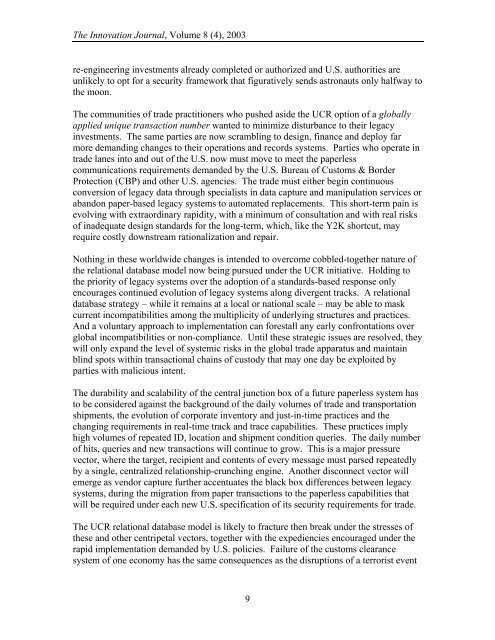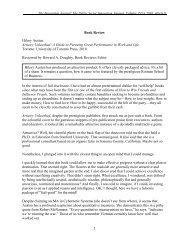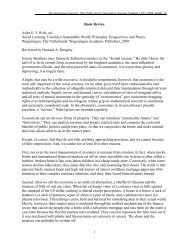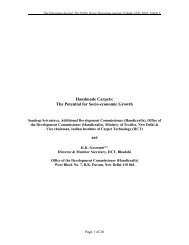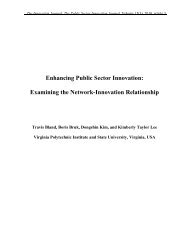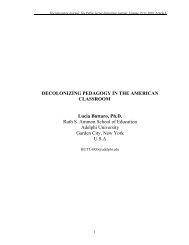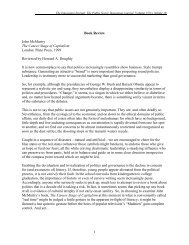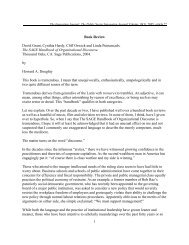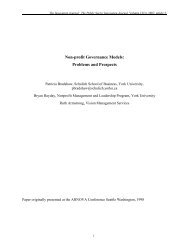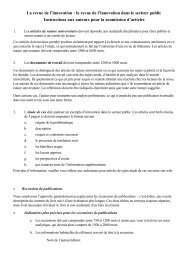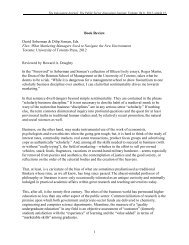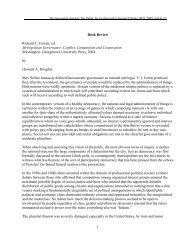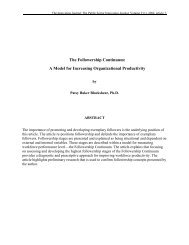Trade Corridor Transparency and Security - The Innovation Journal
Trade Corridor Transparency and Security - The Innovation Journal
Trade Corridor Transparency and Security - The Innovation Journal
You also want an ePaper? Increase the reach of your titles
YUMPU automatically turns print PDFs into web optimized ePapers that Google loves.
<strong>The</strong> <strong>Innovation</strong> <strong>Journal</strong>, Volume 8 (4), 2003<br />
re-engineering investments already completed or authorized <strong>and</strong> U.S. authorities are<br />
unlikely to opt for a security framework that figuratively sends astronauts only halfway to<br />
the moon.<br />
<strong>The</strong> communities of trade practitioners who pushed aside the UCR option of a globally<br />
applied unique transaction number wanted to minimize disturbance to their legacy<br />
investments. <strong>The</strong> same parties are now scrambling to design, finance <strong>and</strong> deploy far<br />
more dem<strong>and</strong>ing changes to their operations <strong>and</strong> records systems. Parties who operate in<br />
trade lanes into <strong>and</strong> out of the U.S. now must move to meet the paperless<br />
communications requirements dem<strong>and</strong>ed by the U.S. Bureau of Customs & Border<br />
Protection (CBP) <strong>and</strong> other U.S. agencies. <strong>The</strong> trade must either begin continuous<br />
conversion of legacy data through specialists in data capture <strong>and</strong> manipulation services or<br />
ab<strong>and</strong>on paper-based legacy systems to automated replacements. This short-term pain is<br />
evolving with extraordinary rapidity, with a minimum of consultation <strong>and</strong> with real risks<br />
of inadequate design st<strong>and</strong>ards for the long-term, which, like the Y2K shortcut, may<br />
require costly downstream rationalization <strong>and</strong> repair.<br />
Nothing in these worldwide changes is intended to overcome cobbled-together nature of<br />
the relational database model now being pursued under the UCR initiative. Holding to<br />
the priority of legacy systems over the adoption of a st<strong>and</strong>ards-based response only<br />
encourages continued evolution of legacy systems along divergent tracks. A relational<br />
database strategy – while it remains at a local or national scale – may be able to mask<br />
current incompatibilities among the multiplicity of underlying structures <strong>and</strong> practices.<br />
And a voluntary approach to implementation can forestall any early confrontations over<br />
global incompatibilities or non-compliance. Until these strategic issues are resolved, they<br />
will only exp<strong>and</strong> the level of systemic risks in the global trade apparatus <strong>and</strong> maintain<br />
blind spots within transactional chains of custody that may one day be exploited by<br />
parties with malicious intent.<br />
<strong>The</strong> durability <strong>and</strong> scalability of the central junction box of a future paperless system has<br />
to be considered against the background of the daily volumes of trade <strong>and</strong> transportation<br />
shipments, the evolution of corporate inventory <strong>and</strong> just-in-time practices <strong>and</strong> the<br />
changing requirements in real-time track <strong>and</strong> trace capabilities. <strong>The</strong>se practices imply<br />
high volumes of repeated ID, location <strong>and</strong> shipment condition queries. <strong>The</strong> daily number<br />
of hits, queries <strong>and</strong> new transactions will continue to grow. This is a major pressure<br />
vector, where the target, recipient <strong>and</strong> contents of every message must parsed repeatedly<br />
by a single, centralized relationship-crunching engine. Another disconnect vector will<br />
emerge as vendor capture further accentuates the black box differences between legacy<br />
systems, during the migration from paper transactions to the paperless capabilities that<br />
will be required under each new U.S. specification of its security requirements for trade.<br />
<strong>The</strong> UCR relational database model is likely to fracture then break under the stresses of<br />
these <strong>and</strong> other centripetal vectors, together with the expediencies encouraged under the<br />
rapid implementation dem<strong>and</strong>ed by U.S. policies. Failure of the customs clearance<br />
system of one economy has the same consequences as the disruptions of a terrorist event<br />
9


